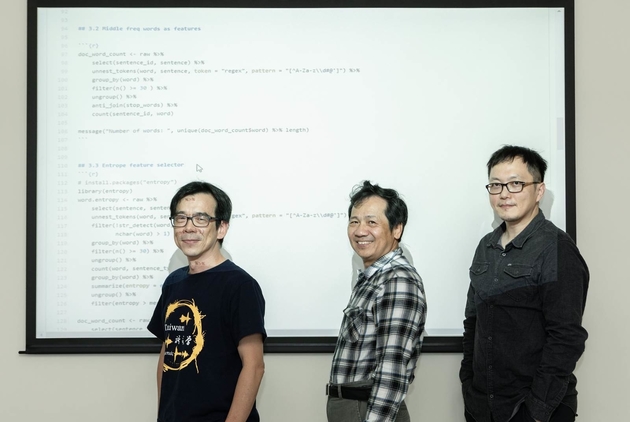Taiwan Linguists Learn to Code as Higher Education Enters Information Age

Source:Justin Wu
Students in humanities classes these days no longer just study books on theory, gazing instead at computer screens while pondering how to write the next line of code. Around 2013 top US universities started introducing Big Data to their social science institutes, and several humanities departments at National Taiwan University followed along with that trend. How has it impacted education in the humanities?
Views
Taiwan Linguists Learn to Code as Higher Education Enters Information Age
By Meng-hsin TienFrom CommonWealth Magazine (vol. 691 )
Students gathered in a classroom at the National Taiwan University Graduate Institute of Journalism are not discussing how to write interview articles on this day. Instead, clutching notebook computers, they follow along with the programming lesson on the screen to write an Internet crawler for their data journalism reports.
Next door at the NTU’s Graduate Institute of National Development, a similar scene played out as students wrote programs to crawl all of the interpolation records from the Legislative Yuan. Using Pivot Tables, the various topics each political party focused on, along with changes in their stances at different times, were clearly laid out.
Challenging people’s assumption, laboratories and Big Data analysis have fast emerged across various departments in the humanities, becoming an unstoppable trend of our time.
Technology Reshaping Humanities Education
Around 2013, US universities including the University of Michigan and the University of California at Berkeley, began introducing data engineering into their social sciences curricula.
At that time Ji-Lung Hsieh, an associate professor at NTU’s Graduate Institute of Journalism, was teaching in the Department of Library and Information Science at National Taiwan Normal University. Hsieh recalls that a group of students have observed the trend in the Columbia University’s data journalism curriculum, and sought out Hsieh at NTNU, who specializes in data analysis, to learn programming. And with this, Hsieh, who had long been interested in journalism and communications, discovered this new realm.
Upon taking a deeper dive into data journalism, Hsieh was hooked, later taking a teaching position at NTU’s journalism school. This year will mark his third year teaching programming in the journalism field to an increasingly large number of students, reflecting new demands.
 Photo by Justin Wu/CW
Photo by Justin Wu/CW
What is “data journalism”? Why should reporters learn programs?
“In the Information Age, data is emerging as an important source for journalists, other than people. They can uncover subjects that competitors haven’t discovered through data analysis,” offers Ji-Lung Hsieh, citing the examples of public opinion wars and Internet trolls. The news information curriculum teaches students first to crawl and analyze the activities of suspicious online bulletin board, Twitter, and Facebook accounts. At the same time, Web crawlers can be used to scrape data from online housing exchange and shopping networks to unearth various issues embedded in everyday life.
On the other side of campus at the Graduate Institute of National Development, also an institute of the social sciences, associate professor Chih-Sung Teng also started teaching a course in data analytics in 2016. With a background in political science, Teng takes a quantitative approach to research, often processing relation analysis.
“Relying on researchers to read one paper after another is not very scientific,” he says. As technology progresses, increasingly more government documents and records are being made public online, making text mining a hot skill in the political science realm.
Teng taught himself the data analysis programming language Python, which he uses in his teaching of textual analysis at the NTU Graduate Institute of National Development. For example, using vector calculations of tens of millions of historical data points from Legislative Yuan interpolations, students grouped each interpolation transcript into clusters by mutual distance from one another. In this way, “we could study different parties’ and legislators’ terminological concepts and orientation of position,” he said.
Among his topics of interest are Chinese people’s impressions of Taiwanese people based on online discussion threads, shifts in the PRC government’s stability maintenance policy and change in attitude based on official government communications and inauguration speeches.
Shu-Kai Hsieh, chair and associate professor at NTU’s Graduate Institute of Linguistics, specializes in computational linguistics, one of several humanities fields most integrally related to programming. “Computational linguistics is a study on how to make computers understand human better,” he offers. With volume of available data exploding in recent years, materials to be analyzed has increased drastically. “Take a video clip for instance, multimodal data like spoken language, gestures, postures, and pauses can all be analyzed.”
Professor Hsieh has also been invited by the NTU Center for General Education to teach an undergraduate course. “The entire class comes from the humanities and social sciences, and hardly anyone has a background in programming,” he says. Not only does he teach Department of Chinese Literature students how to analyze literary symbols, but he even incorporates machine learning, for instance writing programs to automatically generate writing in a certain style, which would have been unimaginable for literature students in the past.
“This also challenges a whole host of assumptions in the humanities, posing questions like whether machine-written texts can qualify as literature? This sort of research and creativity brings out more ideas,” relates Shu-Kai Hsieh.
Sciences vs. Humanities - No Need to Fear Replacement
The three passionate trail blazers all point out that some of their peers do not completely agree with the new direction for fear that the spirit of the humanities will be destroyed. However, the rate of industry disruption and development gives them no time for complaining.
Numerous studies have indicated the importance of multidisciplinary talent and information technology competency, as outlined in a report by the Deloitte accounting firm on key competencies in the digital age. The report underscored the even greater demand for people offering creativity and social intelligence in the future, and that combined mathematical and technological competencies offer even greater protection against being replaced by automation.
“In the past, people and machines were usually antagonistic, but as time goes on the line between them has blurred. Concepts are always changing, whether in humanities education or technological education,” offers Hsieh, implying that the increased accessibility of information means that humanities and technology no longer need to be pit against each other. Nevertheless, he also stresses that students with humanities backgrounds should treat programming as a tool for research and creativity.
“It’s not that everyone should all go and start programming, but that you should know what you want to use programs to accomplish,” explains Hsieh. If using Excel to analyze a set of data is enough, then it is unnecessary to get caught up in Python or R language programming.
“Talents in the humanities still have their advantages. For instance, in working with open data, many science and technology experts only collect and present data. But the journalism students know how to interpret it and tell a story, and that’s what’s really valuable,” remarks Hsieh.
Source: Ji-Lung Hsieh
 Source: Ji-Lung Hsieh
Source: Ji-Lung Hsieh
Translated by David Toman












